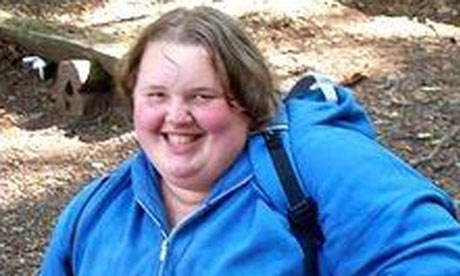
Georgia Davis, "Britain's biggest teen", is in hospital today in Merthyr Tydfil, South Wales, being treated for major organ failure. In an eight-hour operation involving 40 social services staff, police, firemen, ambulance crew, builders and scaffolders, she had to be cut out of the bedroom to which she has reportedly been confined for the past several months, lifted by crane on to a ramp erected for the purpose, and wheeled on a specially strengthened stretcher to a reinforced ambulance.
Her weight has not formally been made public, but friends and neighbours have said it has "rocketed" since last August, when the 5ft 6in, 19-year-old student was weighed at 45st. Some apparently told reporters it could have increased to as much as 63st. How does someone get into such a condition – and is there a way back?
"It is, obviously, an astonishing case, probably unique," says David Haslam, a Hertfordshire GP with a special interest in obesity and cardiometabolic disease, consultant at the Centre for Obesity Research at Luton & Dunstable Hospital, and clinical director of the National Obesity Forum. "This is severe and complex obesity. You can no longer apply the normal logic. Other factors are at play here; profound psychological problems. This is not just someone who has trouble controlling an impulse to snack."
Nadim Haboubi, a consultant physician with a special interest in gastroenterology and obesity management, agrees that in cases such as Georgia's "there is never just one single factor, always more. They can be environmental, emotional, genetic, psychological."
Georgia's father died of a heart attack when she was a small child. She is the registered carer of her mother, Lesley, 57, who has a heart condition and severe arthritis. Her stepfather, Arthur, 71, has lung cancer.
She first hit the headlines in 2008, when the Sun revealed she weighed 33st. Told she needed to "lose 20st or die", she won a scholarship to a children's weight-loss camp in North Carolina, where she shed nearly 15st on a strict 1,500-calorie-a-day diet and an exercise regime supervised by behavioural coaches, food psychologists and fitness trainers. She was declared clear of the Type 2 diabetes she had earlier been diagnosed with, and appeared on Good Morning America, smiling and newly confident.
But within two years she had regained all she lost, and more. Eating in the US, she told the Sun, was "in a controlled environment. But back here ... I felt alone. My parents weren't doing it with me at home, and my friends weren't doing it at college. I know I have no one to blame except myself. But I don't know how to change things."
Without being familiar with all the details of the case, Haboubi says, it does seem clear that Georgia did not receive the support she needed: "These people need continous support, not sporadic intervention. They need the support of a whole multidisciplinary team – doctor, dietitian, psychologist, counsellor."
Nonetheless, says Haslam, it is unusual for someone so young to reach such a great weight. The medical consequences are catastrophic: "The stress is phenomenal, on the heart and other organs. At that age heart failure is the most likely outcome; the heart is simply not strong enough to pump blood around a body that size."
Initial treatment, says Haboubi, will be to stabilise Georgia and try to treat the immediate organ problems. Then, Haslam believes, once she is fit enough she should probably undergo bariatric (weight-loss) surgery. "At the moment, she is way over the limit for operation," he says. "A balloon could be inserted into her stomach, while she loses weight to a level where she's fit for operation. But realistically, I imagine bariatric surgery will probably be her only option."
Haslam is part of a group of physicians, Experts in Severe and Complex Obesity, pushing for greater access to bariatric surgery for such severe and complex cases of obesity as Georgia's; the technique, offered at present to maybe 2% of patients eligible for it, "can permanently induce major weight loss, and 'cure' Type 2 diabetes in 86% of cases," he says. "It is also cost effective – in terms of reduced drug costs and hospital admissions, gastric bypass pays for itself within three-and-a-half years."
So Georgia, Haslam concludes, is "absolutely not a lost cause. She proved in the US that by changing to a sensible diet and lifestyle regime, she can lose weight. But it will require a lot of super-intensive management, of psychologist and physician input, to stabilise her. And you know, to reach that size, you need to be consuming upwards of 10,000 calories a day. One does have to ask where those calories were coming from. What kind of support was she getting?"

